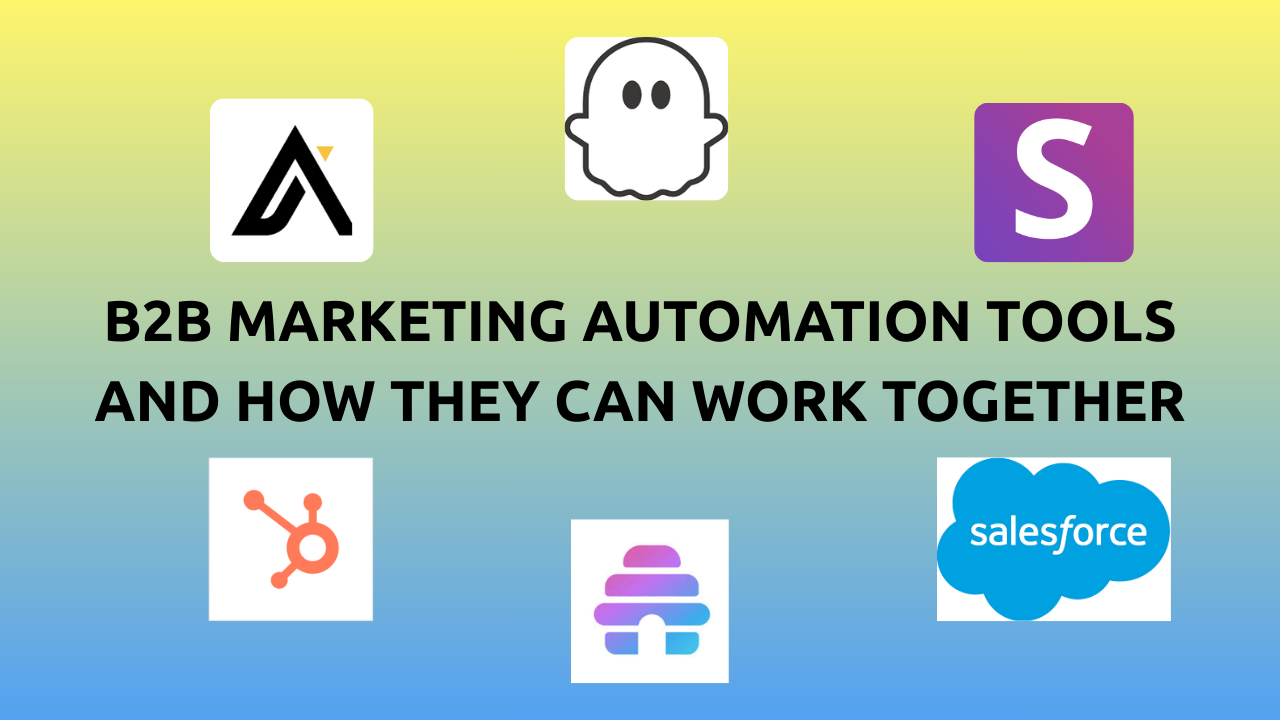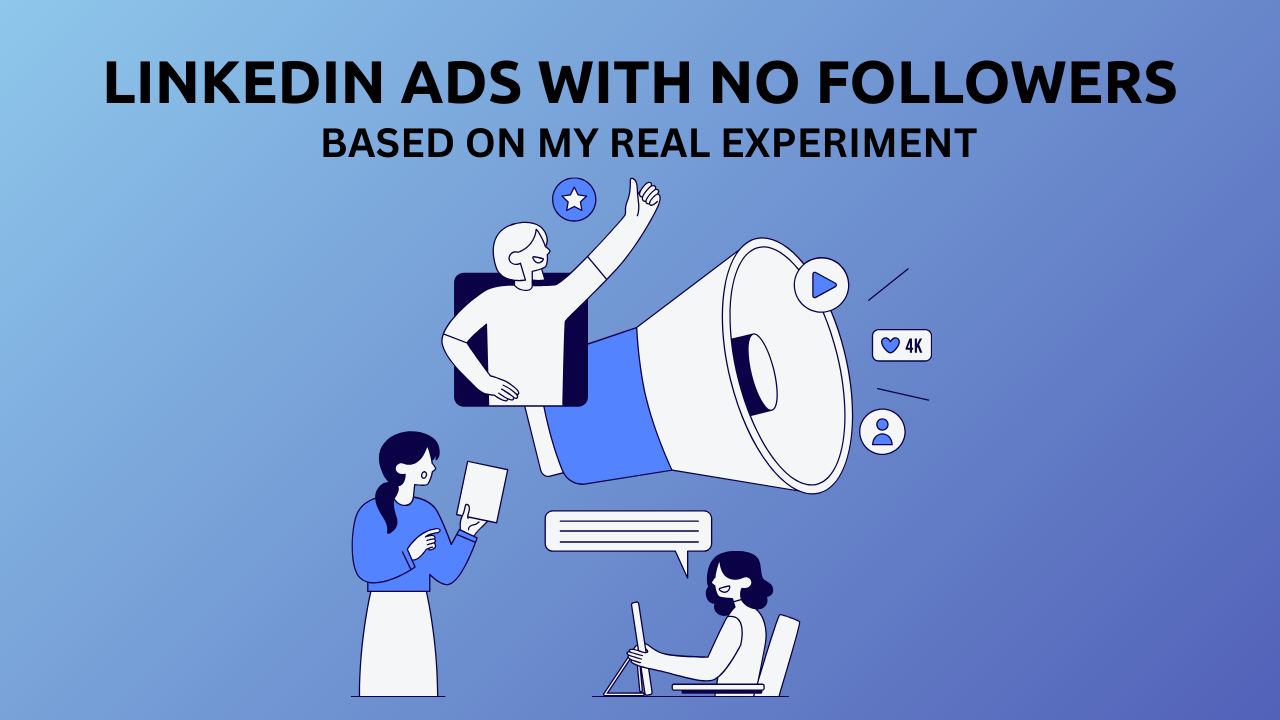How to get a job in marketing: From my experience
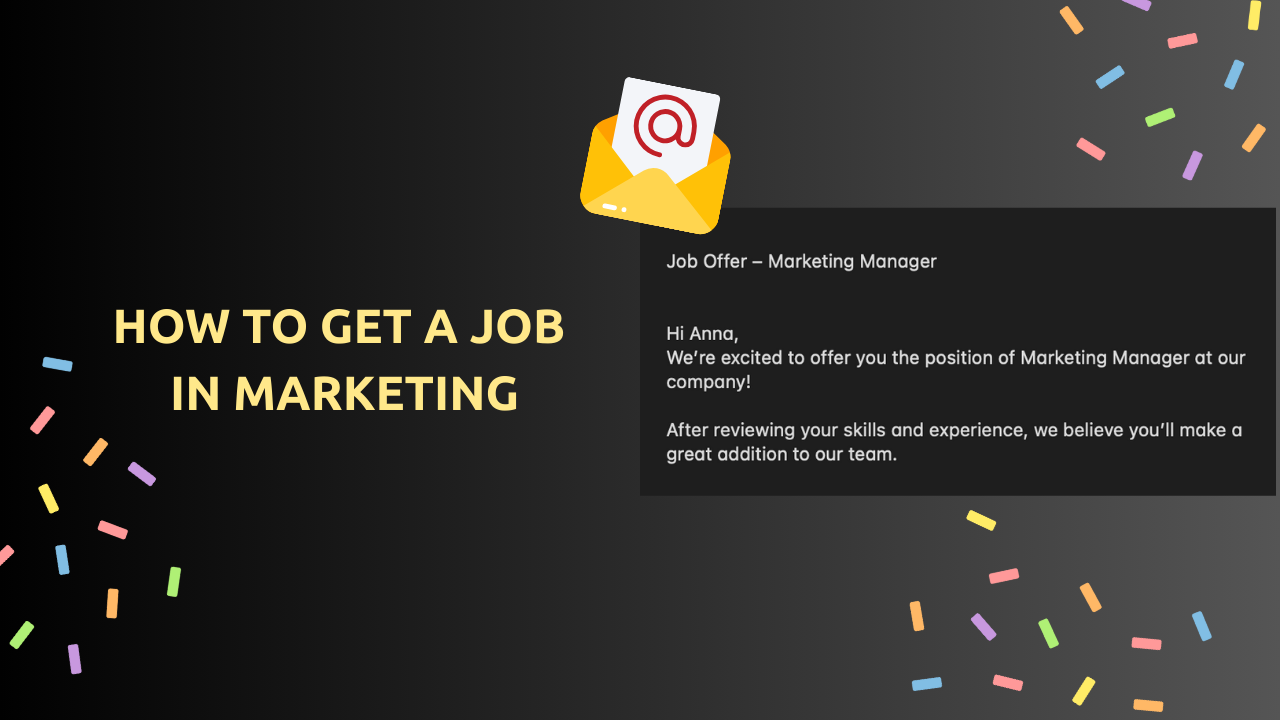
I had to choose my university and my future career at the age of 16. I decided to get a bachelor’s degree in IT Project Management.
Why?
Because I thought that IT people earn a lot, and it can be a remote job.
Three months in, I realized that I hate it and I will not work in IT. In my second year of university, I decided that I needed to take another course of action and try something else. Don’t worry, I did finish my bachelor’s, though.
I ended up finding a school that had various different courses in different areas like IT, digital marketing, content marketing, and others, and decided to try a social media marketing course (it was a short 3-month course).
I didn't know anything about the marketing industry back then. In my second week of education there, I found a job as a Marketing Assistant.
My marketing journey started.
How did I do that? I was just very convincing and sounded super passionate about marketing, so I got hired.
My point is, you don’t need a degree or 3 years of experience to start working in marketing. Yes, I got lucky, but in this article I’m gonna share some tips on how to increase your chances of being hired and get some luck too :).
Keep reading.
For whom is marketing?
I truly believe marketing can fit anybody. Haha, that’s probably so helpful for you.
The thing with marketing is that you can work in many different fields: growing social media accounts, setting up paid ads, working with content marketing, optimizing SEO, doing email marketing, working in analytics, public relations, or designing a product.
That covers all possible areas, such as creativity, analysis, strategic thinking, copywriting, and much more.
So, I truly believe that learning marketing can benefit and be suitable for almost anybody. Here are some things I would highlight that you do need to have in order to succeed (in my humble opinion):
1. What you need at the core is a structure, because even if you’re doing something creative, you still need to track what you’re doing and how it affects the results.
It means you should be organized enough to record, track, and structure everything that you are doing in a way that helps you to optimize your efforts based on the collected results.
I hope it doesn’t sound too complicated and makes sense. 🙂
2. You should be a lifelong learner. Because marketing is changing along with the world, and what worked 10 years ago might not work at all today. There are new tools, platforms, and channels coming out every day, and you need to stay on top of things to keep up with the competition.
3. Now, the third thing might be obvious to someone, but it was not obvious to me when I just started. I also think that it applies to any kind of job that you have, but I want to mention it here anyway.
That is being accountable and taking ownership (sorry for that fancy word) of the projects you lead and the results you do or do not deliver.
When you start to think from a perspective where you are the one who is responsible for the measurable result of the campaign, your contribution and involvement in the project are much higher, and it directly affects the impact.
4. Interest in human psychology. That’s a weird one for you, I bet, but in order to be a good marketer, you need to understand what drives our decisions and what makes people buy (including you).
Believe me, that helps a lot in building a marketing strategy. If you want to know more about that, you can read another article of mine that expands on the topic of marketing strategy and consumer behavior.
If you have these 4 character traits and/or are willing to develop them, you have a high chance of succeeding.
How to choose your marketing area?
That is a question I asked myself many times. I started my marketing journey with social media marketing, then I was doing a lot of photo shooting and video making (content creation overall), later I worked with B2B marketing that included lead generation, outreach campaigns, and website optimization.
Now I’m diving deeper into paid ads and SEO (even though I worked with that before, I decided to deepen my knowledge).
After all of these trials, the only good answer I can give you is TO TRY different things and decide what you like the most.
I know it's easier said than done, but due to some misconceptions about working in marketing, you might be missing the true day-to-day life of a marketer. I hope I can save you some time by briefly describing the main marketing fields.
Small tip: If you don’t know what you’d like to do, start with what you DON’T like to do. I assure you that it will be much easier to start with.
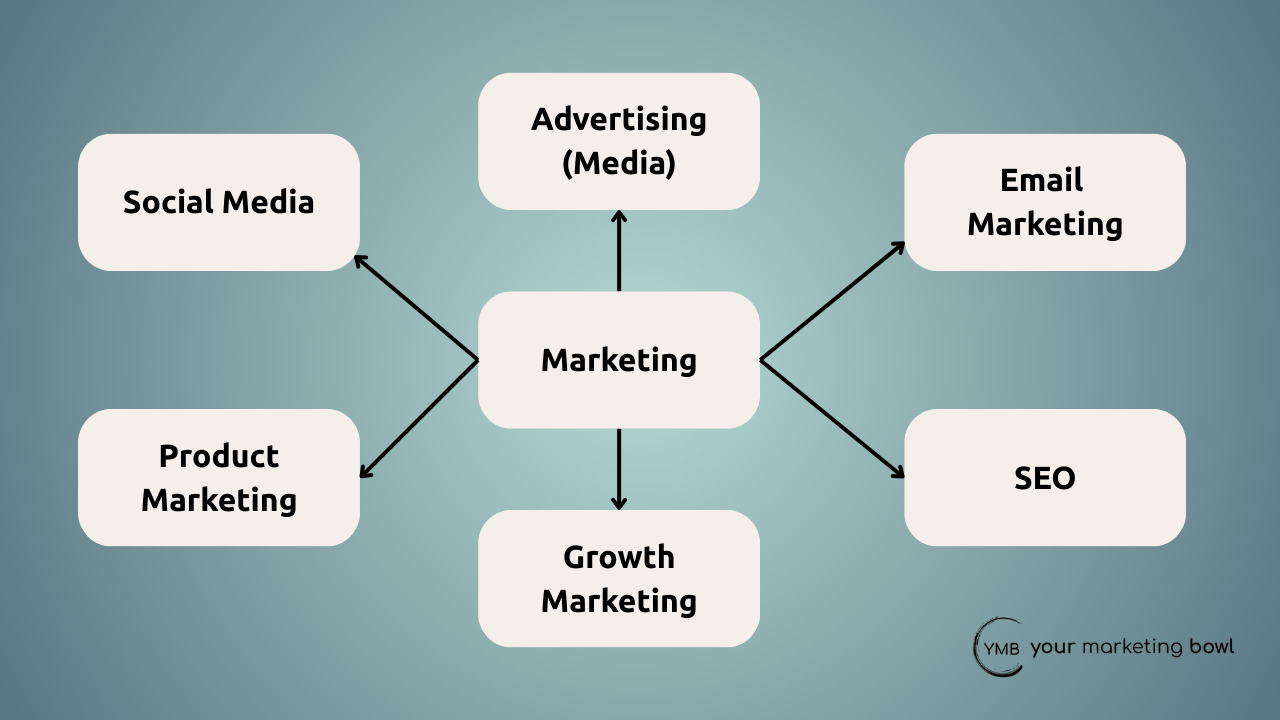
Social Media Marketing
This type of marketing covers everything related to social media promotion, online brand visibility, and growth.
Now the responsibilities may vary in different companies and positions (many things also depend on the size of the company), but mostly they include:
- creating a social media strategy (defining growth channels and budget allocations),
- analyzing your competitors and market,
- creating visual and textual content,
- optimizing and recycling content for different social media accounts,
- setting up Meta ads,
- influencer marketing (buying ads from influencers to promote your product or account).
The platforms you work with can also vary a lot: Instagram, X, Facebook, YouTube, TikTok, Threads, LinkedIn, Discord, and others.
As you can see, there is much more to it than just posting pictures on Instagram.
I would say it’s probably the easiest field to start with due to a large number of open roles, internship opportunities, and the amount of learning materials, but it’s definitely not a one-size-fits-all solution.
Advertising (Media)
The Advertising (Media) field covers everything related to paid ads. For a lot of people, everything that comes to mind when advertising is mentioned is Meta ads (Facebook and Instagram promotion). But there’s much more to it.
You can buy Google Ads (PPC campaigns), display ads on different websites, online videos (videos that pop up on YouTube when you watch your favorite YouTuber), spots on the radio, connected TV, streaming, outdoor banners, covers in printed media, etc.
There is a whole other world of advertising, and I sometimes feel like there is no end to it 😂.
For that kind of work, you definitely need to have an analytical mind and be numbers-savvy. You would need to be able to first structure big sets of data and then analyze them.
What’s most important is that after that, you need to draw conclusions based on the results and optimize the campaign so it performs better. Overall, everything related to Data Analysis will be used here.
It’s also important to mention that in order to buy all of these ads, you will probably need to communicate with a lot of people and go back and forth with your agreements, so be prepared for that too.
Email Marketing
Here, the name speaks for itself. Email marketing is a strategic use of emails to promote your brand, sell products and/or services, and build brand awareness and loyalty. That might sound pretty simple, but there are some pitfalls, too.
If you are working with a large number of subscribers, you would need to know how to segment them properly and personalize each email for each person's individual interests.
You also should know (if you want to be a good email marketer) how to automate emails sent using different platforms. You need to be a great copywriter as well to create catchy headlines and write compelling text.
All that said, email marketing is often required as an additional, not a stand-alone skill (based on my knowledge and experience), but of course, there are exceptions, especially in big corporations.
SEO
SEO stands for Search Engine Optimization and basically means implementing different website improvements (unpaid) in order to drive more organic traffic (visitors) to the website in different search engines.
It can sound pretty confusing, but if I were to explain it to a 10-year-old, I would say that it means making content on your website relevant and useful to the readers (which shows to Google your credibility) by optimizing text, images, and speed, and making the website more user-friendly.
SEO can really feel like rocket science because you need to understand how to do keyword research and analysis, get quality backlinks (a link from one site to another), make your website fast and responsive, and make visitors stay longer and interact with your content.
Your best friends here will be Google Analytics and keyword search tools. I would also say that copywriting stands at the core here, and you need to train your writing a lot to get to a decent level.
I just started diving deeper into it, and it looks pretty exciting to me, but again, there are tons of things to learn.
Growth Marketing
Growth marketing is a marketing approach that combines different marketing fields in order to help businesses grow. That can be a bit confusing because most of the marketing is tailored to help the business grow, so what is the difference then?
Growth marketing is much more data-driven and experiment-heavy. You test a lot of different options, analyze them, and move on with the best-performing one.
If you want to read a little bit more on this topic, you can take a look at the Mailchimp article that talks in-depth about what growth marketing is.
Product Marketing
Product marketing focuses mostly on the product itself.
In that role, you probably would conduct customer development interviews to learn more about people’s expectations of the product (even if it doesn’t exist yet), craft messaging, create a go-to-market strategy, and explore different ways to promote the product.
Product marketing can be very powerful because you get the opportunity to build something completely new from scratch or reinvent something that already exists to make it better for the customers.
In this role, you would need to stay on top of trends, predict people’s desires and needs to turn all that knowledge into something worth launching 🙂.
Truth be told, nowadays a number of companies ask for a blend of different skills, which sometimes might get a bit complicated and overwhelming.
It’s definitely good to have a broader knowledge of different fields to be able to get this so-called “helicopter view,” but I believe you can get extremely good at only one thing.
By that I mean 10+ years of extended knowledge and practical experience in the field, so I’m still on my way there too 😂.
Where do you learn the basics?
After you figure out what marketing area to choose (or at least try), the next question is, where do you learn?
I wouldn’t go for paid courses right away, especially if you are not 100% sure what field to go after. Start with all this ton of info from the internet. Some of my favorite resources are.
Books
I love to read about human psychology that explains why we buy what we buy, what drives our buying decisions, and our behavior. It’s extremely interesting to read, even if you have nothing to do with marketing.
That at least could give you an understanding of different tactics and approaches that companies use to attract people’s attention.
If you want to get specific examples, you can check out my article “8 ways to learn marketing skills (from beginner to pro),” where I give particular examples of books and other helpful resources.
Free online courses
There is a bunch of helpful stuff out there that you can explore for free. It takes discipline and consistency to study something that you didn't pay for 😂, but I believe that if you’re truly interested, you can be consistent.
At this stage, you need to try to learn as much as you can about the particular field and the fundamentals. Study digital marketing tools online, Google free Digital Marketing courses and start from there.
After that, you can ramp up with paid courses and materials.
Here are some suggestions that you can start with: “Free Marketing Courses".
YouTube and blog posts
Watching videos like “One day in the life of a marketing manager in NY” (or something that sounds less fancy) or YouTube tutorials could help you understand what the routine of a marketer might look like.
Now, please be careful because not all people show the reality, and in a lot of cases in the video, things are sugarcoated and have very little to do with reality. Nonetheless, it’s a good place to start exploring.
I also love blog posts, because you can read about different topics from the perspective of an expert. At the same time, you can also learn from them. Stay with me and subscribe to the newsletter if you want to learn a little bit more about marketing from me.
How to get started in marketing with no experience?
I started by applying for Assistant and Marketing Internship positions. I’m a visual learner, and it’s really challenging for me to learn new stuff on my own (no matter what it is).
So I definitely needed some mentors who would show me exactly how to do things and explain why to do things that way.
I also know that some people start with their own small projects to learn things, which is a great path as well. You can consider starting your own IG page or YouTube channel to develop your small business or personal brand.
Another idea is to suggest doing some stuff for free for different clients to build your portfolio at the beginning. But that can be tricky if you don’t know what to do at all.
If we focus on the internship path, I would highlight a couple of things to keep in mind.
During the internship, you need to think about future job searches right away.
Don’t miss the opportunity to learn something new, and what’s most important, MAKE SOME RESULTS.
Think from the very beginning: what numeric result will I be able to put in my CV after this internship?
For example:
- Increased the amount of IG followers by 15% in 3 months with targeted ads
- Suggested and implemented a new content strategy that brought 2K more visitors per month
- Set up a new project management system and educated the team about it, which brought up the productivity by 30%
I understand that, pretty often, when you are an intern and just starting, it’s extremely hard to have a direct impact on the result.
You need to keep in mind that if you're working in a team and, besides you, there are 4 other people working on the same thing, you still contributed to the result, and it still counts. What’s important is that you know how to do it and can repeat it if need be.
What I strongly DO NOT recommend is lying in your CV and saying you’re an expert in the things you know very little about.
How to look for a job if you already have some experience (for example, after the internship)
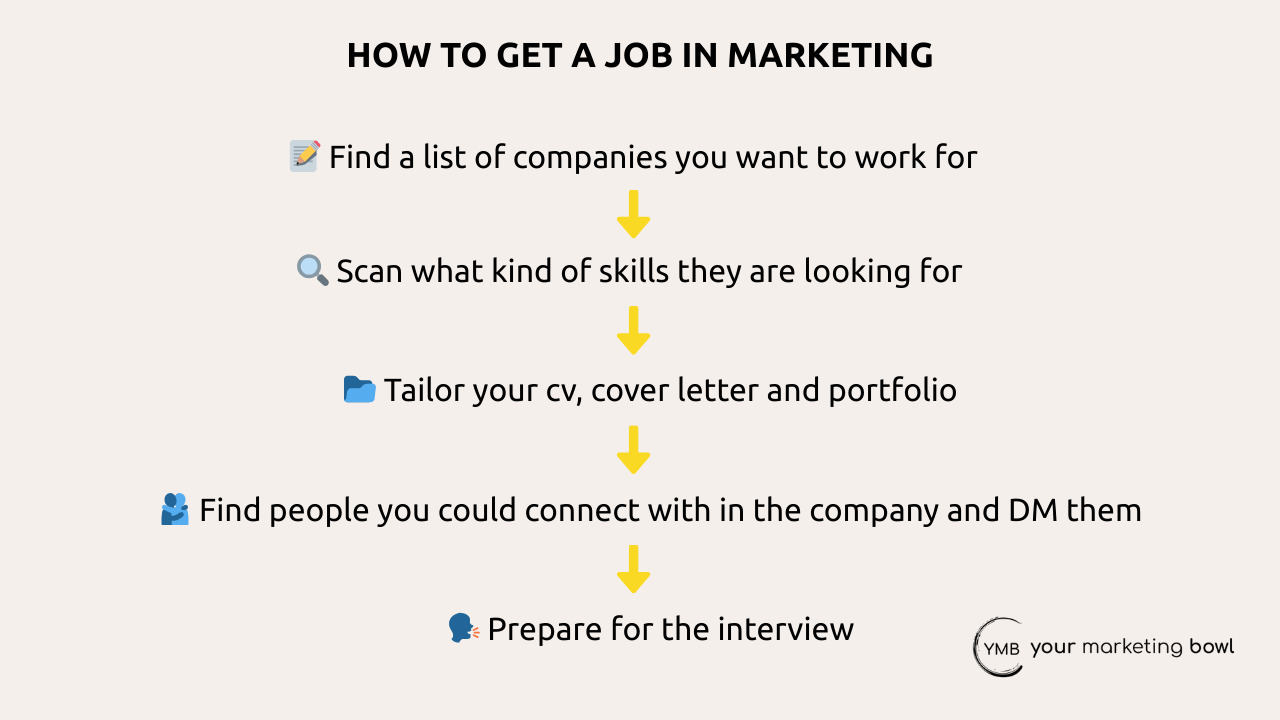
Here are 5 steps that I think will improve your chances of landing a job:
- Find a list of companies you want to work for
- Scan very carefully what kind of skills they are looking for
- Tailor your CV, cover letter, and portfolio specifically to those results
- Find people you could connect with in the company and DM them
- Prepare for the Interview
1. Find a list of companies you want to work for and that have beginner positions (let’s be realistic).
I would start with this step on the stage of your internship/side hustling (when you are still gaining experience). That will help you to prepare for the future and understand what potential employees might look for.
Think of a company you would like to work for. What are they doing? What is their product? What mission do they have? What kind of work culture do they present?
Set your career goals at this stage.
It will help you to figure out where to look for the company. You don’t necessarily need to apply for jobs only on LinkedIn. You can also Google companies and check if they have a career page on their website.
This is a time for you to do extensive research and find a handful of companies that you consider a good fit for yourself.
This step is made to help you find a workplace where you will want to stay longer and that will fulfill you. Of course, nothing is guaranteed, and some companies are good only on paper and not in real life, but it’s worth trying anyway.
2. Scan very carefully what kind of skills they are looking for.
After you find some companies you feel curious about, you need to carefully look over their job description and spot what kind of skills they are looking for.
Probably you will miss a lot of those if you’re just starting and have less than 1 year of experience (yeah, guys, sorry, just the truth of life).
What I would recommend doing in that case is to think about different ways to gain that particular experience.
You can ask for that particular work during your internship, you can study a bunch of information on the internet, and you can take an extensive course on the topic if you find it interesting and beneficial. In that way, you will have much higher chances of getting a job.
I truly believe that you need to monitor the market on a regular basis and check what kind of skills are in demand to always stay in the loop and tailor your skills based on the current state of things.
3. Tailor your CV, cover letter, and portfolio specifically to those results.
That doesn’t mean that you should lie. It means you should understand what this employee is looking for and show him that you are the person who can provide that.
It’s also important to understand that now a lot of CVs are viewed with AI tools. It’s called Applicant Tracking Systems (ATS). And you need to optimize your CV for ATS, too. You can learn a little bit more about ATS in the Indeed article.
Now, let’s dive a little bit deeper into each step.
How to write a CV
First, choose the simplest CV template with no picture and a clear structure. That sounds pretty obvious, but some people still try to find some fancy templates on Canva and use them. It should be easily readable by humans and the ATS.

In the CV itself, you need to list achievements, not the responsibilities. You need to show exactly how you helped the company to increase the number of clients or revenue, or how much traffic you drove to the website, or by what percentage you increased the team’s productivity, etc.
Pay attention to keywords that the job description has and try to include as many of them as possible in your CV (when it’s relevant). If you don’t have particular experience with email marketing but you studied it in the course, don't forget to mention it in the Education section.
How to write a cover letter
The cover letter should be concise.
Keep it simple and show why you are the person who’s gonna benefit the company. For example, if that’s a fitness platform, you can mention that you’ve always been into sports, and you’ve been seeing people make the same mistakes with exercises over and over again, so you can clearly see how their app would be beneficial to customers.
Don’t make it longer than ¾ of the page.
One little trick that I used to attract attention is to put a company's logo in the top corner of the page. That way, I believe you have a slightly higher chance of being noticed by the recruiter.
How to organize your portfolio
There is a mistake I made with my portfolio at the beginning. I put it all in Google Drive in different folders like Videos, Reels, Newsletters, Design Examples, etc.
Later, I realized that nobody’s gonna open and look through it, because it just takes so much time. After I consulted with a specialist, I decided to remake it completely.
I made it in a presentation in PDF format.
One page = one company/project.
All the projects I described followed this principle: Problem ➡️ Goal ➡️ What was done ➡️ Results. I also included links to my photo/video and design work when it was relevant throughout the presentation.
That is much more efficient and has higher chances of converting to the first interview.
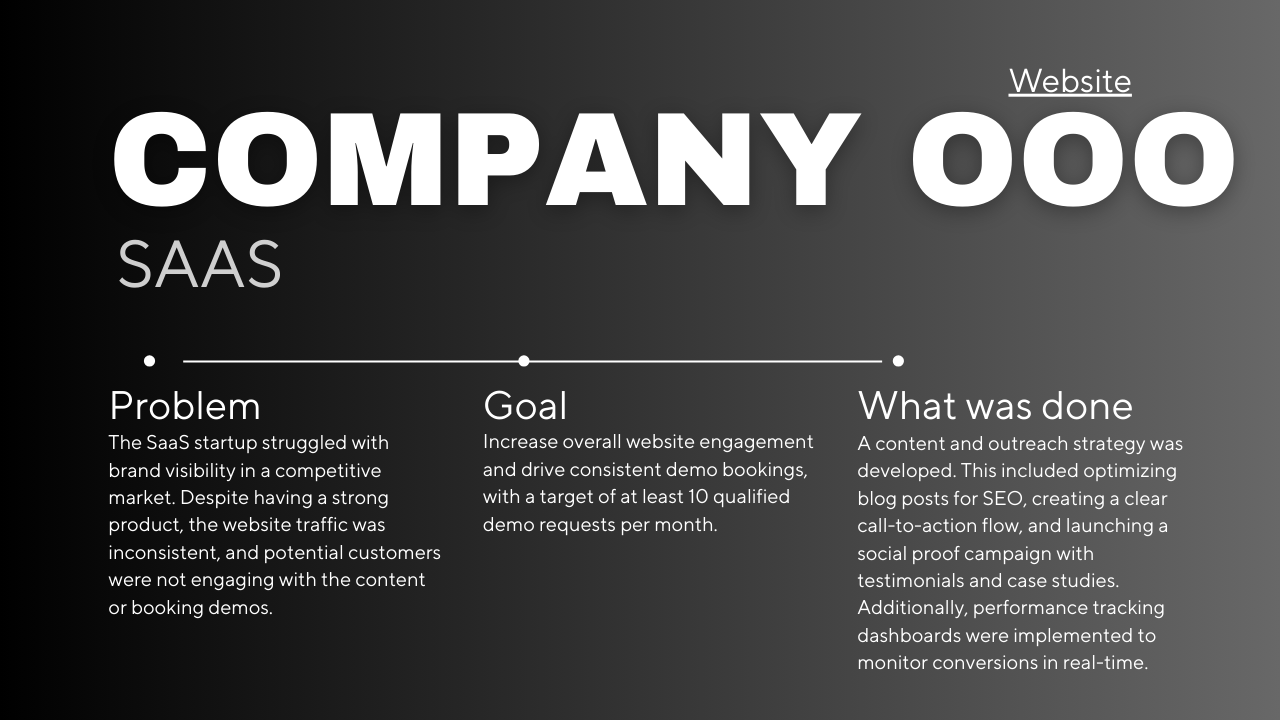
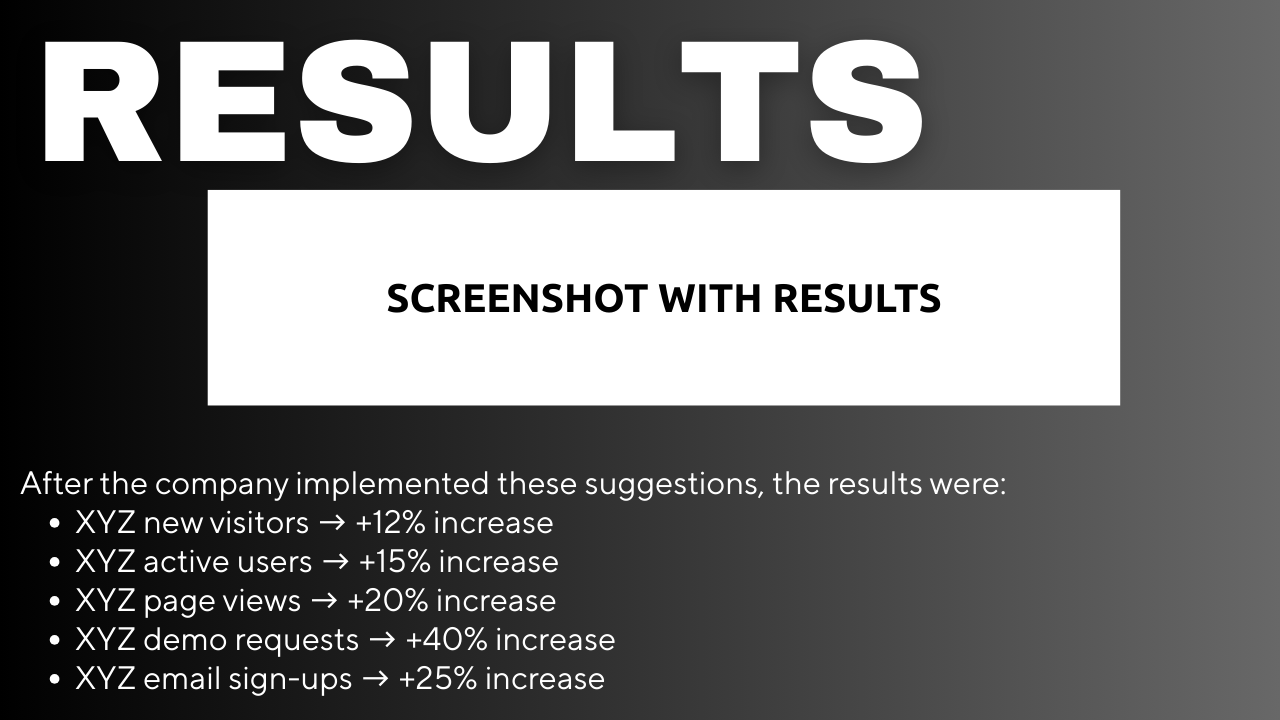
4. Find people you could connect with in the company and DM them.
Another thing that I tried and that I know worked for a number of people is finding people who already work for the company and texting them.
You need to understand that your message shouldn't be a hire-me-I-beg-you kind of message, but more like, “Hey, here are my skills and knowledge; I could be helpful to the company in X, Y, and Z. Is there any way I could straighten out my application or contact some people to talk to directly?”
Here’s one more thing that worked for me: emailing the companies you liked directly (even if they are not hiring) and representing yourself and your skills.
Don’t forget to send your CV and portfolio so they can see right away what your skills are. At the end, just ask if they would consider hiring a new employee or keep you in mind for future opportunities.
I know the response rate will be pretty low on these, but it definitely increases your chances of getting hired by a bit (that’s how I was hired once).
5. Prepare for the Interview
That’s a very important step that you cannot neglect. Even if you are sure of your skills and knowledge, you HAVE TO prepare.
Here are some of my tips for that:
- Study the company’s website and socials. Notice how they present their product or service and what collaborations they have made recently. Were they successful? Write down a couple of ideas for improvement that you would suggest.
- Do a competitor's research. Check who their competitors are in the market and how they are different from your company. What are they doing better or worse?
- If the company is big enough, find it on Glassdoor and read reviews and interview questions that they ask (yes, they have this section there, too). Create a Google Doc with all the possible questions and answer them.
- Prepare 3 different situations that you had before in your career and describe them following this structure: Problem ➡️ How you solved it ➡️ What results it brought.
- Practice. Practice. Practice. I think you heard that “practice makes perfect,” so try to talk out loud and answer these questions. It’s ok talking to yourself, but you can also ask somebody to ask you the questions that you prepared.
And don’t be sad if you get rejected the first time. I got rejected many times, but eventually I always found a job, because I kept trying. Hope that helps :).
Is it worth starting the journey now when the market is so competitive?
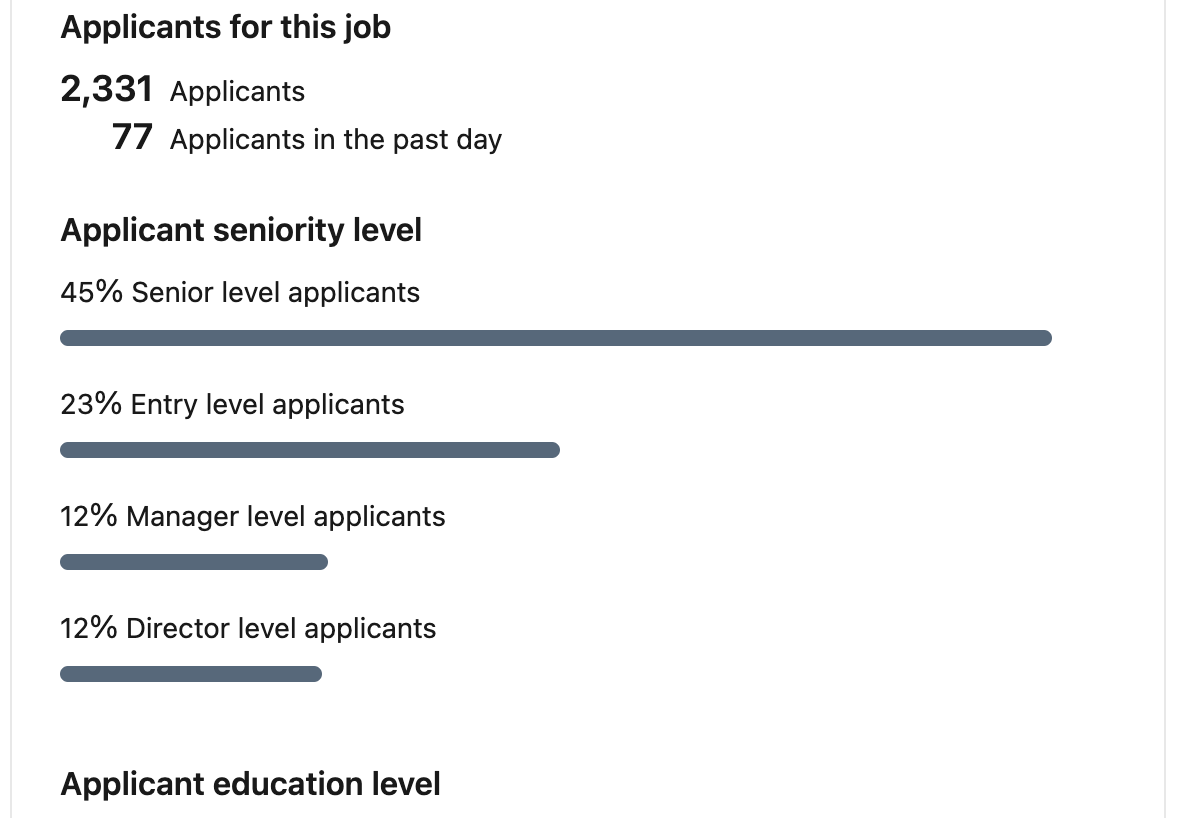
I know a lot of people say now that the marketing field is super competitive, and it’s not worth going there due to the high competition.
Well, it’s true. It is very competitive, but it doesn’t mean that you shouldn’t go.
Believe me, there are a lot of companies out there that are struggling to find good candidates, and the hiring process stretches for 6-12 months.
You can always become a professional that companies are hunting for.
Yes, it takes time and a lot of effort, but it’s definitely an exciting journey.
The content on this site is for informational and entertainment purposes only and should not be taken as financial advice. For full details, see the disclaimers section.

Subscribe for marketing advice
I'd actually give a friend
Join our mailing list and never miss a story.

